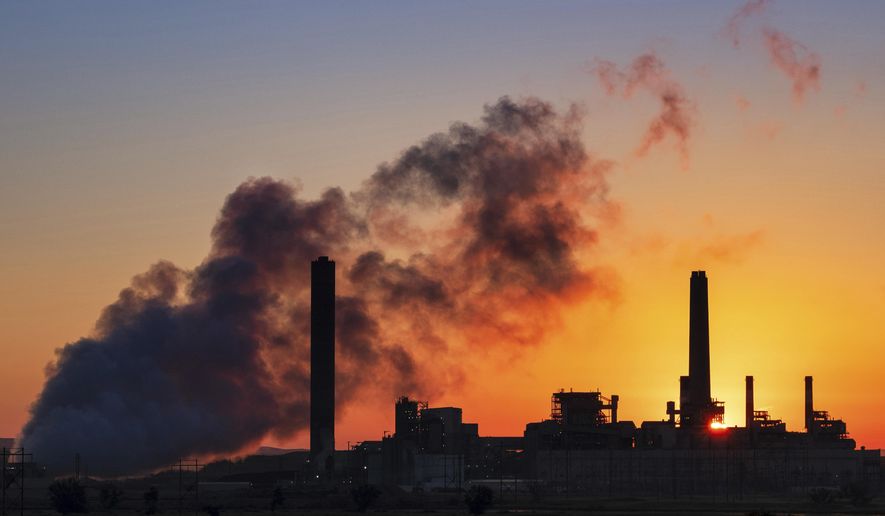The Environmental Protection Agency on Thursday proposed rolling back the Obama-era rules on coal-fired power plants, a key element of the previous administration’s so-called “war on coal” that President Trump has vowed to end.
The agency moved to scale back the Obama administration’s 2015 Clean Air Act performance standards on greenhouse gases from new, modified and reconstructed coal-powered utility stations, regulations that have been denounced as all but impossible to meet.
Andrew Wheeler, acting EPA administrator, said the proposed “high, yet achievable, standards” would encourage the development of clean-burning coal technology and keep energy prices affordable while promoting the U.S. energy boom.
“To put it in clear and simple terms, we’re rescinding unfair burdens on America’s energy providers and leveling the playing field so that new energy technologies can be part of America’s future,” said Mr. Wheeler at a press conference.
Among those decrying the move was Sen. Tom Carper, Delaware Democrat, who pointed out that the announcement came during the annual United Nations climate summit and that the “disconnect could not be more stark or dangerous.”
“[A]s the world discusses meaningful solutions to deal with climate change, this EPA is choosing, instead, to exacerbate the problem by doubling down on dirty coal technology,” said Mr. Carper.
Mr. Wheeler argued that improving coal-burning technology will benefit global efforts to cut emissions. Despite the 2015 Paris climate agreement, the use of coal has actually expanded, particularly in Asia.
“The previous administration tried to take the U.S. coal industry out of the energy mix, which means that we would be no longer developing clean coal technologies here in the United States,” said Mr. Wheeler. “Our proposal will encourage new investments in cleaner coal technologies and by encouraging clean coal here in the United States, we will be encouraging it worldwide.”
The Obama-era EPA standard, enacted under the Clean Air Act section 111(b), required new coal-burning plants to capture greenhouse-gas emissions and store them underground, a technology that has remained commercially unworkable.
Whether the proposed rollback, which will be submitted for comment in the Federal Register, can turn the tide for domestic coal-fired plants is another question.
In 2018, U.S. coal consumption is expected to hit a 39-year low. No new U.S. coal-fired plants are scheduled for construction, thanks both to the Obama administration’s regulatory regimen and the falling price of natural gas, which has replaced coal in some utility plants.
“Coal use is at its lowest level in nearly four decades and the Trump Administration can’t stop this country from continuing to move beyond coal,” said Mary Anne Hitt, director of the Sierra Club’s Beyond Coal campaign.
Michelle Bloodworth, CEO of the American Coalition for Clean Coal Electricity, said 40 percent of the U.S. coal fleet has been retired or plans to retire, but she was optimistic about coal’s future.
“EPA policy should not drive energy policy, which certainly has been the case in the past,” she said at the press conference. “EPA’s proposal today will make it possible to build new coal plants to replace some of the retirements and consequently help make this nation’s energy portfolio healthy.”
Senate Majority Leader Mitch McConnell argued that “coal deserves a level playing field” and lauded the Trump administration’s ongoing drive to slash federal regulations.
“Earlier this year, the president unveiled his plan to dismantle the so-called Clean Power Plan, a policy designed to shut down nearly every active coal plant,” said Mr. McConnell on the Senate floor. “Now President Trump’s EPA is also targeting another regulation that would have made it nearly impossible to build any new plants in the future.”
The Obama regulations effectively banned construction of new coal-fired power plants, “a policy Congress never approved and would not pass if put to a vote,” said Competitive Enterprise Institute senior fellow Marlo Lewis.
“By lifting the ban, EPA’s proposal will help restore the separation of powers and safeguard affordable energy for American consumers,” Mr. Lewis said.
Meanwhile, the climate group 350.org took a shot at Mr. Wheeler — who previously lobbied on behalf of coal producer Murray Energy — saying that “he’s doing exactly what you’d expect: enriching his fossil fuel billionaire buddies at the expense of the climate and the rest of us.”
Mr. Wheeler pointed out that the United States has led the world in reducing emissions: From 2005-17, total energy-related U.S. carbon-dioxide emissions fell by 14 percent while global emissions rose by 20 percent.
Harry Alford president and CEO of the National Black Chamber of Commerce, applauded the proposed rule change, citing the impact of higher energy costs on black and Hispanic communities.
“We’re looking at good policy, effective policy and realistic policy,” Mr. Alford told reporters.
Mr. Trump campaign in 2016 to end the Obama administration’s “war on coal.” Before he was elected president, then.-Sen. Barack Obama famously said in 2008 that “if somebody wants to build a coal-powered plant, they can; it’s just that it will bankrupt them.”
“The Obama-era rule defied economic reality, making the opening of new coal plants all but impossible by requiring expensive, impractical carbon capture technology,” said American Energy Alliance president Thomas Pyle. “We are pleased that the Trump Administration has taken yet another action to stop the political and regulatory assault on beautiful, clean coal.”
• Valerie Richardson can be reached at vrichardson@washingtontimes.com.




Please read our comment policy before commenting.